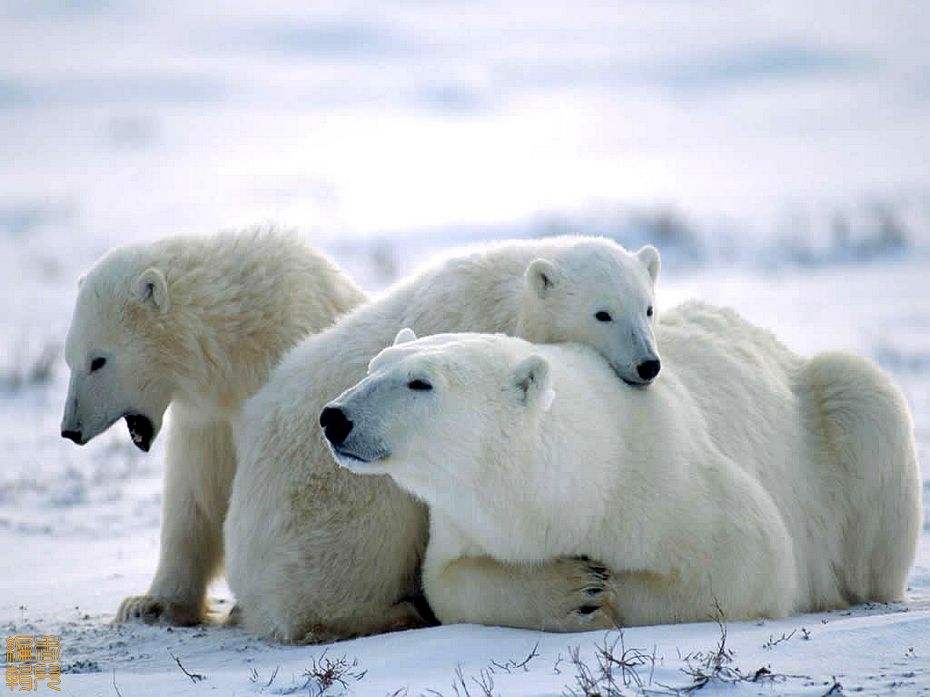(单词翻译:单击)
听力文本
This is Scientific American — 60-Second Science. I'm Christopher Intagliata.
As climate change warms the Arctic, sea ice there is disappearing at record rates—sea ice that polar bears prefer to prowl. As a result, some bears are spending more time on solid land. And are thus switching up their diets, too. Instead of the ringed seals they ate out on the ice, the bears are foraging on bowhead whale carcasses, cast up on the beach.
So what does this mean for the bears?
"It's sort of good news/bad news." Melissa McKinney, an ecotoxicologist at the University of Connecticut. The bad news is that the bears are losing vital habitat. But the silver lining is that bears decamping to land have lower levels of toxic mercury due to their changes in diet.
McKinney and her team studied hair samples from one polar bear population in Alaska, from 2004 to 2011. In that time they saw a 65 percent drop in the bears' mercury levels—to concentrations below the known threshold for negative biological effects. And it looks like the different diet may be the reason.

Bowhead whales feed on plankton, while ringed seals eat fish and other animals in which mercury has had the chance to accumulate. "So if polar bears are feeding on prey items that are lower in the food chain, then they're likely experiencing a less mercury-contaminated food source than they would be otherwise."
The bears that feed on whales are also in better condition—higher body-mass index. And being well fed means their bodies don't need to break down fat and muscle energy stores, where a lot of whatever mercury they have consumed is locked up. The study is in the journal Environmental Science and Technology.
"We see polar bears as a sentinel of climate change. And I think it's really important for us to remember that, either positively or negatively, climate change can shape the risks that are posed by other environmental stressors—in this case toxic pollutants." Of course, it would be better to stop the warming and have less mercury in the environment. But the takeaway here is that climate change has multiple effects that go beyond disappearing ice.
Thanks for listening for Scientific American — 60-Second Science Science. I'm Christopher Intagliata.
参考译文
这里是科学美国人——60秒科学。我是克里斯托弗·因塔利亚塔。
气候变化使北极变暖,北极的海冰正在以创纪录的速度消失,而海冰正是北极熊偏爱的觅食地。这一现象使一些北极熊待在坚固陆地上的时间越来越多。它们的饮食也因此而改变。它们不再在冰上捕食环纹海豹,而是开始以被冲上海滩的的露脊鲸尸体为食。
这对北极熊来说意味着什么?
“这既是好消息,也是坏消息。”康涅狄格大学的生态毒理学家梅丽莎·麦金尼说道。坏消息是,北极熊正在失去它们赖以生存的栖息地。但万幸的是,由于饮食变化而转移到陆地上活动的北极熊,其体内的有毒汞也随之减少。
从2004年至2011年,麦金尼和团队研究了阿拉斯加一个北极熊群体的毛发样本。他们发现,那段时间北极熊身上的汞含量下降了65%,其浓度低于负面生物效应的已知临界值。饮食变化可能是其原因。
因为露脊鲸以浮游生物为食,而环斑海豹则吃鱼和其它可能积聚汞的动物。“因此,如果北极熊捕食的是食物链中较低层的猎物,那它们食物来源的汞含量很可能比之前的低。”
以鲸鱼为食的北极熊体重指数更好,它们的身体状况也改善了。饮食良好意味着它们的身体不需要分解脂肪和肌肉能量储备,因而它们消耗的大量汞均被冻结。这项研究发表在《环境科学与技术》期刊上。
“我们将北极熊看作气候变化的哨兵。我认为对我们来说重要的是要记住,无论是积极的还是消极的,气候变化会影响其他环境压力因素造成的风险,这里指的是有毒污染物。”当然,最好的方法是阻止气候变暖,减少环境中的汞含量。但关键是,气候变化会带来多种影响,不只是海冰消融。
谢谢大家收听科学美国人——60秒科学。我是克里斯托弗·因塔利亚塔。
译文为可可英语翻译,未经授权请勿转载!
重点讲解
重点讲解:
1. due to 由于;因为;
例句:Sale is down a bit due to the revaluation.
由于货币升值销售额有下降。
2. break down (使)(物质)分解;
例句:Over time, the protein in the eggshell breaks down into its constituent amino acids.
时间久了,蛋壳中的蛋白质就会分解为其构成成分氨基酸。
3. lock up 将……锁住;
例句:Don't lock up all resources in a single project.
不要把我们的所有财力都搁死在一个项目上。
4. see as 认为;把…看作;
例句:I see it as a portent of thing to come.
我把它看作是将要到来的事物的前兆。


